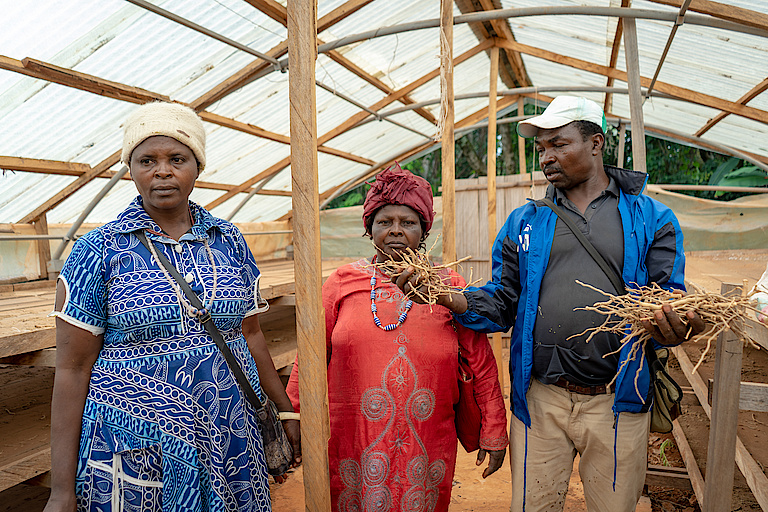When it comes to ABS implementation, the ABS Initiative is supporting three four processes:
developing capacities to implement ABS provisions within the Global Biodiversity Framework (GBF); strengthening capacities to integrate ABS/Biotrade into national conservation, trade and economic policies; establishing Multi-Stakeholder Partnerships; empowering and ensuring active participation of Indigenous People and local communities (IPLC); and improving capacities in Digital Sequence Information (DSI).
Lessons from the Initiative’s activities directly support the Secretariat of the Convention on Biological Diversity (SCBD) in the implementation and development of the Global Biodiversity Framework (GBF).
- Developing and conducting technical trainings on ABS implementation specifically for IPLC, in particular on value chain management and ABS negotiation
- Developing and applying new approaches to integrate IPLC into ABS processes (e.g., Social and Behavior Change), in addition to established Bio-cultural Community Protocols (BCP)
- Initiating and supporting Multi-Stakeholder Partnerships between representatives from the government, the private sector, research institutes and IPLC in order to foster ABS processes, enable ABS agreements and, ultimately, ABS-compliant Biodiversity-based value chains
- Jointly with partners developing a Cooperation Index to assess the level of satisfaction of the private sector with ABS and to start a dialogue between them and governments with the goal to improve the conditions for ABS implementation
- Analyzing the relationship between ABS as a concept and in its current implementation with the transformation agenda, and developing new approaches to ABS implementation through scientific methods in a multi-disciplinary cooperation with the University of Bonn (Germany), the University of Namibia, the University of Western Cape (South Africa), and the Helmholtz-Center for Environmental Research (Germany) as well as through the support of a project of the University of Cape Town and the NGO People Plants International (“Re-Thinking ABS”)
- Supporting international research projects in the more effective implementation of benefit-sharing through simplified approval procedures, e.g., through joint workshops and exchanges
- Supporting the integration of Research & Development, BioTrade and the utilization of biological resources and equitable benefit-sharing in national trade and economic policies, with a focus of integrating the goals of the GBF into the African Continental Free Trade Area (AfCFTA)
Already during the negotiations of the Nagoya Protocol in the early 2000s, the Initiative supported key African stakeholders by organizing preparatory meetings, high-level events and (sub-)regional multi-stakeholder workshops and trainings. As a result, the “African Group” was able to negotiate with one voice and effectively participate in the negotiations of the Nagoya Protocol which was adopted on 29 October 2010 in Nagoya, Japan.
Over the years, the ABS Initiative advised the development of draft Nagoya Protocol compliant policies and regulations in African partner countries, such as Benin, Cameroon, Madagascar, Micronesia, Morocco, Namibia, Palau, Samoa and Senegal. It also provided assistance in the development of a sub-regional ABS strategy for Central Africa.
Experts of the ABS Initiative promoted the negotiation of ABS agreements for several natural ingredients / products through capacity building of local providers and regulators as well as facilitating the negotiations that led to the signing of ABS agreements, e.g. in Cameroon, Namibia and South Africa.
Also in collaboration with the NGO Natural Justice, the Initiative has supported indigenous peoples and local communities (IPLCs) in managing their natural resources and interacting with potential users and governmental institutions. Key instruments in this regard are Biocultural Community Protocols (BCPs) and Social Behaviour Change (SBC) methods which, among others, capacitate IPLC to participate in ABS processes and, ultimately ABS negotiations. Facilitated by the Initiative, BCP processes in several African countries led to agreements between IPLC and industrial users.
The ABS Initiative supported the development of the African Union (AU) policy and technical guidelines for the coordinated implementation of the Nagoya Protocol in Africa. The two documents provide strategic and practical step-by-step directions and tools to guide African countries in the implementation of the Nagoya Protocol.

